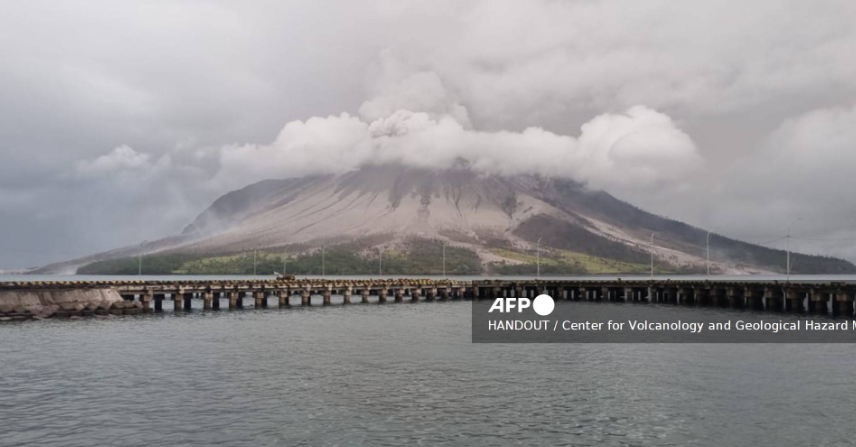
Tsunami threats force evacuation after Indonesia volcano
After a volcano erupted five times on Thursday, causing officials to close a nearby airport and issue a warning about falling debris that may cause a tsunami, Indonesian rescuers rushed to evacuate thousands of people.
After erupting four times on Wednesday, Mount Ruang's crater blazed with lava against a backdrop of lightning strikes overnight, prompting authorities to elevate the alert level to the highest of a four-tiered system.
The closest international airport in Manado City, Sulawesi Island, was closed for a whole day by authorities on Thursday morning due to the volcano in Indonesia's most remote area continuing to spew smoke.
Authorities reported that they were working quickly to remove 11,000 people from the surrounding area, which included the isolated island of Tagulandang, which is home to about 20,000 people.
Some residents were already trying to flee in a panic, according to officials.
According to a statement released on Thursday by Jandry Paendong, an official with the local search and rescue organisation, "people evacuated last night on their own but without direction due to the volcano's eruption and materials in the form of small rocks that fell, so the people scattered to find evacuation routes."
He said that twenty employees were using rubber boats to assist with the evacuation of residents along the volcano's coastline.
In order for his group to "carry out evacuation for people in the coast or near the coast" facing the volcano, he requested additional boats and supplies.
Visitors and locals were advised to stay outside the six-kilometer exclusion zone.
Before four more explosions on Wednesday, more than 800 residents were first evacuated from Ruang to the neighbouring island of Tagulandang after the first eruption on Tuesday evening.
Authorities also issued a tsunami warning in response to the eruptions.
The head of Indonesia's volcanology agency, Hendra Gunawan, stated in a statement on Wednesday that "the communities in Tagulandang island, particularly those residing near the beach, (need) to be on alert for the potential ejection of incandescent rocks, hot clouds discharges and tsunami caused by the collapse of the volcano's body into the sea."
The prior experience added to the authorities' concerns.
A significant eruption in 2018 caused large portions of Mount Anak Krakatoa to fall into the ocean, partially collapsing the volcano's crater and injuring many more. The tsunami that resulted from the eruption claimed over 400 lives.
Because Indonesia is located on the Pacific "Ring of Fire," an arc formed by the collision of tectonic plates that spans the Pacific basin and extends from Japan through Southeast Asia, the country is subject to frequent seismic and volcanic activity.
Sam Ratulangi International Airport in Manado City, which is more than 100 kilometres (62 miles) from Mount Ruang, was forced to close due to the volcano's impact for a full day on Thursday evening.
The Manado region airport authority office's head, Ambar Suryoko, stated in a statement that the runway closure was "due to the spread of volcanic ash which could endanger flight safety."
Airlines to Singapore, as well as places in South Korea and China, operate out of this airport.
"Every flight is affected because the airport is impacted by the volcanic ash eruption of Mount Ruang," a 29-year-old Manado airport officer named Dimas said over the phone to AFP.





